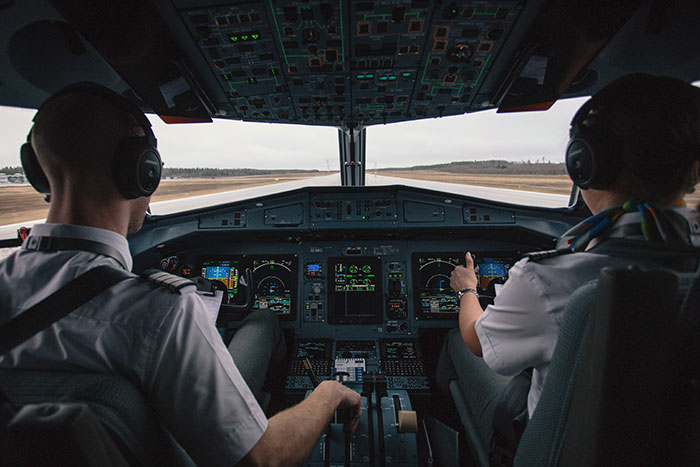
For many, becoming a pilot is just a dream. For others, a reality. There has never been a career more illustrious than that of a pilot. There are many different types of pilots, but this article will tell you about becoming an airline pilot. You can also become a private pilot, a sport pilot, a recreational pilot, a flight instructor, and a commercial pilot. An airline pilot is a pilot who flies an airline jet internationally and carries tourists and travelers throughout the world.
This page will tell you how you can start your journey toward becoming an airline pilot. It is a very difficult task and can be very hard to do, but when you achieve it and do finally become a pilot, it will be your greatest success and a moment that you never forget.
Here is how you can start your journey toward becoming an airline pilot. Make the right choice.
Qualifications
To work as a commercial pilot, you may be required to have qualifications. These qualifications are subject to the country that you live in, so it is worth checking them out at your local university or community college.
PPC
You will then, when qualified, require a PPC or Private Pilot Certificate. These certificates are gained at flight school. By researching this subject and deciding to click here, you have likely not yet attended flight school, so will not know what to expect. The flight school will see you start in a single-engine plane – this stage of your training focuses on the fundamental aspects of flying and being a pilot, and is the foundation for more advanced studies and certificates. Higher-learning flight schools that deal with larger planes will not allow you entry unless you have received your private pilot certificate, and in some places, it is a legal requirement.
Instrument Rating
The next step in your journey toward becoming a pilot is to gain an instrument rating. When you have earned your instrument rating, you will be able to fly a plane in all types of weather, but can only do this after you have your PPC. Instrument rating relates to a set of regulations that govern and dictate civil aviation. You need to gain your instrument rating – and without it, you will not be able to pursue your dream of becoming a pilot.
CPC
Following your instrument rating, you will need to apply for your CPC or commercial pilot certificate. The commercial pilot certificate is another fundamental part of becoming a pilot, and you will be required to fly much larger planes than you did in your initial private pilot training. Pilots are required to meet specific requirements should they want to become a commercial pilot, as they will not only be being paid to fly but will be flying with multiple passengers, ultimately meaning they need to be the best of the best. When you have your CPC, you will be able to earn a living flying.
FIC
Your FIC or Flight Instructor Certificate is not mandatory in all countries. However, working as a flight instructor can give you valuable experience. This means you are paid to fly while enhancing your experience to fly. Airlines will also look upon you more favorably the more qualifications that you have and will be more interested in you if you have much more experience. The experience gained from flight instructing is, indeed, very valuable.
Multi-Engine Rating
Just like the instrument rating is essential, so is the multi-engine rating. Having your multi-engine rating added to your license will mean that you can fly larger planes with multiple engines. This is virtually the final step toward becoming an official pilot. Your multi-engine rating will be added to your commercial pilot license, and it means you are fully equipped and ready to get started. Gaining this is the final step required before finding employment as a commercial pilot, and when this is achieved, you can pursue whichever career you choose.
Experience
As was mentioned previously, you must have experience. You can gain experience by doing flight instructing, but you should also go out on your own and practice flying. Flying as a pilot is a job that carries a lot of responsibility, and if you are not prepared, or if you do not know what you are doing, many lives (including your own) are at risk. You must always be confident in your flying abilities when setting out in a plane, as one mistake can cost you and everyone on your plane their lives. Get as much experience as you can. Flying a smaller jet is nothing compared to flying a massive commercial airline jet. Practice, practice, and more practice. Do not stop practicing ever – even after you have the job. It is very easy to get rusty and forget the techniques and tactics you have learned.
Work
By the time you have met all of the criteria previously mentioned, you will be able to apply for your ATP or Airline Transport Pilot certificate. When you have achieved that, you will be eligible to fly for a commercial airline and will meet the hiring requirements for most regional airline pilot jobs. You may also find work as an international pilot for a foreign company. This entire process can take up to, and sometimes over, two to three years. You will learn a lot, and if you stay determined and motivated, you will become a pilot and achieve your dreams.
Being a pilot is not for everybody – but if it tickles your fancy, perhaps you should consider going down to your local flight school and getting started on your journey toward becoming a pilot. Working as a pilot is a very rewarding career and will allow you to see the entire world, so why not give it a go?
Now, with the help of this page, you know more or less everything there is to know about becoming a pilot. Anyone, providing they have what it takes, can become a pilot. Good luck!


